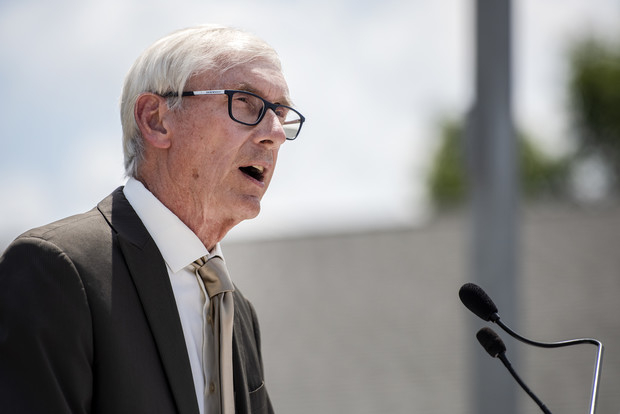Evers Vetoes 43 GOP Proposals
Killing Republican bills on guns, election changes, COVID-19, but does sign 35 other bills.

Gov. Tony Evers speaks during a press conference Tuesday, July 6, 2021, in Waukesha, Wis. Angela Major/WPR
Democratic Gov. Tony Evers has vetoed dozens of Republican-authored bills covering a wide range of Republican priorities, from making it more difficult to vote absentee in Wisconsin to making it easier to legally carry concealed guns.
While the number of vetoes — 43 in all — was high, they were not unexpected, and even though Republicans have big majorities in the Legislature, they’re not big enough to override the governor.
Evers did sign 35 bills Friday, including a bill that passed unanimously and sets aside more than $40 million to construct a replacement for the Lincoln Hill School for Boys in Irma.
Here’s a rundown of Friday’s action by the governor.
Election bills
Evers vetoed nine GOP bills that would have changed election laws in Wisconsin, saying in veto messages for each plan that the right to vote “should not be subject to the whims of politicians” who don’t like the outcome of an election.
“This legislation is among many that have been sent to my desk during this legislative session, each passed under the guise of needing to reform our election system because elected officials in this state have enabled disinformation about our elections and election processes,” Evers wrote. “I have and will object to each and every effort by this Legislature and its members to undermine our democracy.”
While some of the bills that Republicans passed would make more technical changes to voting, others were more broad.
The bills Evers vetoed would have:
- Banned the use of private election grants and banned local clerks from correcting information on a witness certificate for absentee ballots;
- Changed how the state defines which voters are “indefinitely confined,” a status that lets them vote absentee without having to produce a photo ID;
- Required the state to use a database maintained by the U.S. Citizenship and Immigration Services to verify citizenship for those who register to vote;
- Created new hurdles for requesting absentee ballots;
- Forced the state to check voter registration information against state Department of Transportation records;
- Given the Legislature more power to block federal election guidance, to cut funding and staff at agencies found to have violated election laws and to block policies of the Wisconsin Elections Commission;
- Potentially removed voters from the state’s voter registration list based on information they submit for jury selection.
Republicans could reintroduce some of those bills — and other more dramatic changes to election laws — next year, particularly if a Republican defeats Evers in the 2022 governor’s race. Democrats have used that possibility in campaign and fundraising pitches calling for Evers’ reelection.
Assembly Speaker Robin Vos, R-Rochester, said in a statement that Evers’ vetoes showed a “disregard” for Wisconsin priorities.
“He has yet again refused to protect the integrity of our elections by vetoing legislation that prohibits private funds in our elections, closes voter ID loopholes, protects our senior’s right to vote, cleans voter rolls, and holds state agencies accountable for violations of election laws,” Vos said.
Gun bills
Evers also vetoed three bills that would have expanded the right to carry concealed guns in Wisconsin.
One bill would have let people with concealed carry permits keep guns in their cars on school grounds, a move Evers said would erode Wisconsin’s gun-free school zone laws that go back decades.
“This bill neither improves public safety nor addresses gun violence in our state by allowing for an increased presence of firearms — including loaded firearms — on school grounds,” Evers wrote.
Evers also vetoed a bill that would have let people carry firearms in a place of worship on the grounds of a private school.
In addition, the governor vetoed a plan that would have recognized concealed carry permits granted by other states, regardless of whether those states conduct criminal background checks.
COVID-19
As he has throughout the past two years, Evers vetoed GOP bills that would have restricted the government’s powers to respond to COVID-19 and future pandemics.
One bill would have banned the state from declaring businesses “essential” or “nonessential” during a public health emergency, a reference to terms the Wisconsin Department of Health Services used to decide which businesses could keep their doors open in the early days of the COVID-19 pandemic.
Evers also vetoed a bill that would have banned schools from requiring students to wear masks if the students’ guardians opt out of the requirement. The same bill would have required schools to provide a full-time, in-person option for students.
And the governor vetoed a plan that would have required employers who mandate coronavirus vaccines for employees to instead accept proof that someone already contracted COVID-19.
“I am vetoing this bill because I object to preventing employers from making decision that are informed by science,” Evers wrote.
Lincoln Hills
The most high-profile bill signed by Evers will set aside almost $42 million in bonding authority to construct a replacement for the troubled Lincoln Hills School for Boys.
State lawmakers voted in 2018 to close Lincoln Hills following repeated reports of abuse and neglect in the youth prison. It was originally supposed to be closed by 2021, but the facility remains open because state officials have yet to build a new facility to replace it.
Evers blamed the Legislature for the delay in closing the facility, saying he was happy to be signing the plan to move juvenile inmates to Milwaukee.
“By doing so, these kids will be closer to home, their families, and their support networks, so we can set them up for better success both while they are in our care and when they re-enter our communities,” Evers wrote.
The measure’s Senate sponsor, Sen. Van Wanggaard, R-Racine, issued a statement putting the blame on Evers.
“It’s important to remember that we’ve been in this place before,” Wanggaard said in the statement. “This is the second time that Governor Evers needs to find a site to house juvenile offenders in Milwaukee.”
While the proposal has occasionally stoked fiercely partisan debates in the Legislature, the final bill passed unanimously.
Police bills, federal funds
Evers also vetoed a package of GOP bills that would have spelled out how he can spend a portion of roughly $2.5 billion in federal funding from the American Rescue Plan Act, sometimes referred to as ARPA. That funding has been an ongoing point of contention between Republicans and Evers, who has sole authority over how to spend it under Wisconsin law.
Among the vetoed plans was a bill that would have set aside $10 million in federal funds for local police grants, a plan that would spend $1 million on police recruitment and retention, and a proposal to spend $1 million on police academies.
Evers recently introduced his own package of public safety spending that would be paid for by about $56 million in federal funds.
Evers also vetoed GOP bills that would have spent $20 million in ARPA funding to promote apprenticeship programs and $10 million on talent and retention programs focused on veterans.
Diversity education
Evers vetoed two bills that would have undercut efforts to teach about diversity or race.
One of the bills would have withheld state funds from local governments or state agencies if they teach “that one race or sex is inherently superior to another race or sex and that an individual, by virtue of the individual’s race or sex, bears responsibility for acts committed in the past by other individuals of the same race or sex.”
The other would have let students take a course in the U.S. Constitution or Bill of Rights to satisfy a requirement for diversity or ethnic studies.
“This legislature must stop using our students as political pawns,” Evers wrote.
While the Legislature could return to Madison to attempt overrides of the governor’s vetoes, the votes would only be symbolic, and GOP leaders had previously indicated that the Legislature was finished with its business for the rest of 2022.
Listen to the WPR report here.
Gov. Tony Evers vetoes GOP election, gun bills was originally published by Wisconsin Public Radio.






















Everyone of the proposals were backwards corrupt laws to keep Republicans in power.